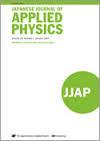Reduction mechanism of loss tangent of scandium-doped aluminum nitride thin film by post-deposition annealing
IF 1.8
4区 物理与天体物理
Q3 PHYSICS, APPLIED
引用次数: 0
Abstract
Scandium-doped aluminum nitride thin films are key materials for MEMS applications including bulk acoustic wave devices for communication. Although one drawback is the increase in the loss tangent with increasing Sc concentration, the loss tangent is reported to decrease after post-deposition annealing. However, the underlying mechanisms remain unclear. In this study, we propose the hypothesis that a low-resistivity thin layer near the surface of a substrate is one of the main reasons for the high loss tangent, and that annealing enhances the resistivity, eventually decreasing the loss tangent. The reasonability of the hypothesis was successfully confirmed by analyzing the frequency response of the loss tangent using an equivalent circuit with current–voltage characteristics, cathodoluminescence, etc. This achievement represents a significant step toward advanced methods for reducing the loss tangent and its application to other thin-film materials.沉积后退火降低掺钪氮化铝薄膜损耗正切的机理
掺钪氮化铝薄膜是微机电系统应用(包括用于通信的体声波器件)的关键材料。虽然其缺点之一是随着钪浓度的增加,损耗正切会增加,但据报道,在沉积后退火后,损耗正切会减小。然而,其基本机制仍不清楚。在本研究中,我们提出了一个假设,即基底表面附近的低电阻率薄层是造成高损耗正切的主要原因之一,而退火会增强电阻率,最终降低损耗正切。通过使用具有电流-电压特性的等效电路分析损耗正切的频率响应、阴极发光等,成功证实了这一假设的合理性。这一成果标志着向降低损耗正切的先进方法及其在其他薄膜材料中的应用迈出了重要一步。
本文章由计算机程序翻译,如有差异,请以英文原文为准。
求助全文
约1分钟内获得全文
求助全文
来源期刊

Japanese Journal of Applied Physics
物理-物理:应用
CiteScore
3.00
自引率
26.70%
发文量
818
审稿时长
3.5 months
期刊介绍:
The Japanese Journal of Applied Physics (JJAP) is an international journal for the advancement and dissemination of knowledge in all fields of applied physics. JJAP is a sister journal of the Applied Physics Express (APEX) and is published by IOP Publishing Ltd on behalf of the Japan Society of Applied Physics (JSAP).
JJAP publishes articles that significantly contribute to the advancements in the applications of physical principles as well as in the understanding of physics in view of particular applications in mind. Subjects covered by JJAP include the following fields:
• Semiconductors, dielectrics, and organic materials
• Photonics, quantum electronics, optics, and spectroscopy
• Spintronics, superconductivity, and strongly correlated materials
• Device physics including quantum information processing
• Physics-based circuits and systems
• Nanoscale science and technology
• Crystal growth, surfaces, interfaces, thin films, and bulk materials
• Plasmas, applied atomic and molecular physics, and applied nuclear physics
• Device processing, fabrication and measurement technologies, and instrumentation
• Cross-disciplinary areas such as bioelectronics/photonics, biosensing, environmental/energy technologies, and MEMS
 求助内容:
求助内容: 应助结果提醒方式:
应助结果提醒方式:


